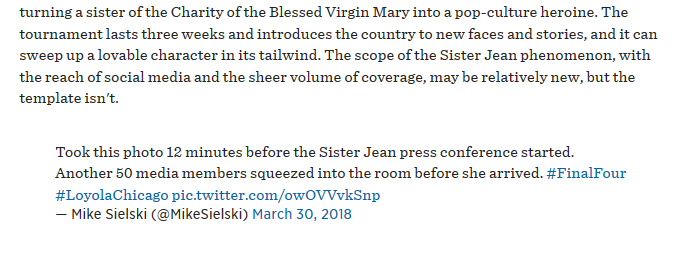The amazing run of the Loyola Men’s Basketball team in the 2018 March Madness made national news. The Ramblers’ last-second upsets over Miami in the first round and Tennessee in round two brought the team to its first Sweet Sixteen since 1985. All of the success brought new attention, not only to the team, but to the adorable 98-year-old team chaplain, Sr. Jean Dolores Schimdt, BVM (Sisters of Charity of the Blessed Virgin Mary) who quickly became a national star.
Sister Jean is a staple at the Rambler games. She has been the team’s chaplain since 1994. She regularly travels to games and even presents her own scouting reports to the team. Sister Jean instantly captured the hearts of people all across the world. Articles about Sister Jean started popping up all over the internet, and she became the subject of dozens of memes.* Sister Jean was even the most talked about person on Twitter on March 19, 2018 [1]. These articles, images, videos, and tweets about Sister Jean are valuable to save in the archive, but are unlike the physical material we keep in our archives. Many websites use several different types of media within an article. While the articles or images are similar to physical material we keep in the archive, embedded tweets, videos, and gifs add a new dimension to the material that is unique to the Internet.

Lit Catholic Memes. Twitter.com. March 28, 2018.
In order to save the digital material, the WLA uses the web archiving service Archive-It. Web archiving has been around for roughly a decade. Archivists recognized the need for a digital archive in an ever-evolving technological world. Links to articles can become broken, videos get taken down, and posts are deleted, so web archiving allows an organization to capture a web page and save it to be viewed later. Saved material no longer needs to access data from the original site. Once saved our pages will not be updated or changed even if the original content is changed or removed.
Archive-It is a great tool for us to save all of the Sister Jean articles and make them available to the public. The only issue is, web archiving can be tricky. Special rules have to be applied to various sites in order for them to capture correctly. Social media, according to Archive-It, is a “moving target” and can be a bit unpredictable.
On top of some inherent difficulties of web archiving, I was a complete newbie to web archiving and Archive-It’s particular set up. I learned by trial and error on the site; some of the first tests I ran to capture pages turned out to be disasters. Formatting was off. Pictures didn’t capture. However, after searching forums, reading help articles, and submitting help tickets, the results got better and better.
Many of the problems I faced at the beginning were, as my dad would say, PICNIC issues: Problem In Chair Not In Computer. The more I learned about web archiving, and about Archive-It, the better the results were. While there are things that I am still struggling to capture correctly, I am getting promising results for many of the sites we attempt to save.
This was one of our first attempts at capturing this article from Philly.com. I captured the image and the text of the article, but there was an embedded Tweet with an image that didn’t show up.

First Crawl Attempt
After lots of research, and many more tests, I got this result. The formatting was correct, but the picture was missing.

Second Crawl Attempt
Finally, I got it all right at the same time, and ended up with a saved article that matched perfectly with the live version of the article.

Final Crawl attempt
The digital response to Sister Jean and the success of the men’s basketball team produced huge amounts of digital content. Web archiving digital content allows archives to supplement the physical collection with material that is not available in any other format. Soon the collection will be completed and made available to the public through Archive-It, and anybody will be able to search and view our Sister Jean-March Madness Collection.

Sister Jean GIF, Giphy.com/NCAAMarchMadness, 3/27/18
*captioned images or videos typically spread on social media
Molly is a Graduate Assistant at the WLA and is in the first year in the joint Public History/Library Information Science program with Loyola University Chicago and Dominican University. She enjoys running, reading by the lake, and cheering on the Cardinals despite being surrounded by Cubs fans.
Loyola University Chicago’s Women and Leadership Archives Blog is designed to provide a positive environment for the Loyola community to discuss important issues and ideas. Differences of opinion are encouraged. We invite comments in response to posts and ask that you write in a civil and respectful manner. All comments will be screened for tone and content and must include the first and last name of the author and a valid email address. The appearance of comments on the blog does not imply the University’s endorsement or acceptance of views expressed.
